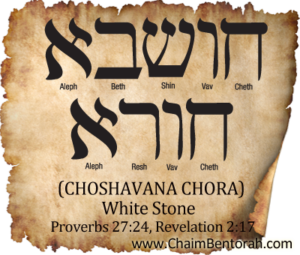ARAMAIC WORD STUDY – THE WEDDING DANCE – CHADOTHA חדותא Cheth Daleth Vav Taw Aleph
Proverbs 27:24: “For riches do not endure forever, and a crown is not secure of all generations.”
Revelations 2:17: “To him that overcomes will I give to eat of the hidden manna, and will give him a white stone, and in the stone, a new name written, which no man knoweth saving he that receives it.”
 The word rendered as crown in Proverbs 27:24 is nezer which is not a crown at all, but a diadem or, more specifically, the stones in a diadem. The various gemstones in a diadem were considered more than symbolic in ancient times, it was believed that these stones carried powers to protect, heal and bring about stability. Today we wear such gemstones for ornamental purposes and no one, except some fringe elements, actually believes that these stones offer such powers.
The word rendered as crown in Proverbs 27:24 is nezer which is not a crown at all, but a diadem or, more specifically, the stones in a diadem. The various gemstones in a diadem were considered more than symbolic in ancient times, it was believed that these stones carried powers to protect, heal and bring about stability. Today we wear such gemstones for ornamental purposes and no one, except some fringe elements, actually believes that these stones offer such powers.
Would you like Chaim Bentorah as your personal Hebrew teacher?
|
|
The stones in a king’s diadem had other purposes. A king’s diadem would have a white stone set among many other stones. The white stone had his name engraved on it. If he were to remove that stone and give it to someone, that would represent the ultimate authority a king could give to someone. Later the white stone took on new meanings. By the first century A.D, the white stone became an engagement stone. It later took on the form of an engagement ring with the white stone being represented as a diamond. It symbolized a man giving a woman authority over his heart. However, in the first century, the groom would give his bride a white stone, and engraved on the stone would be a special name, a pet name. As lovers do today they would give their beloved a name like Sweets or Sugar Babe. Such names were often embarrassing and thus were kept secret between the two lovers and used only between themselves. Only one person in the world could call a woman by that special name, and that would be her husband, her beloved. Another practice with the gemstones would be that the king would remove a stone from his diadem to give as a gift to a special servant. It could be a red stone that represents a certain amount of royal power being bestowed upon this servant, or it could be a green stone, representing his restoration, or a blue stone representing wealth or riches. When a subject received a gemstone from the king’s diadem, it would represent the transference of certain power or favor upon the person. It showed that this person and the king were joined together in a common enterprise and the stone would be a tangible object of this bond which could be seen with the naked eye.
Solomon who wrote this passage could have this in mind. As a king, he could have given away gemstones from his diadem, but the power they granted would not last beyond his own lifetime and could not be passed unto the next generation. The word secure as rendered in Proverbs 27:24 is chasan in the Hebrew and really means wealth or power. Hence the wealth or power of the gemstone is not wealth and power for all generations.
Perhaps from this little historical understanding, we might come to a broader understanding of Revelations 2:17: “To him that overcomes will I give to eat of the hidden manna, and will give him a white stone, and in the stone a new name written, which no man knoweth saving he that receives it.” God is saying that He will give us a white stone with a new name written on it. It is a name that only He can call you by. Just like no other man than a woman’s husband can call her Sugar Babe or Honey Child. He gives it to us on a white stone symbolizing that all that He has He is giving to you, He is giving you the key to His heart.
Hi there! Thank you for reading this Daily Word Study. Can I ask a favor? Share this Daily Word Study with your friends on Facebook and Twitter by clicking one of the icons below.
Thanks & Blessings, it means a lot to me!







Love this!